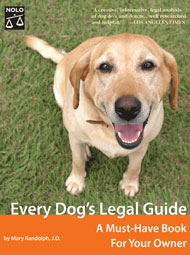Police
The police may not be very interested in barking dog problems, and you can't much blame them. Unless you live in an exceptionally quiet and peaceful place, police have lots more serious problems on their hands. But a note or oral warning from the police can be very effective; people don't want visits from police. You may be able to make your complaint anonymously, to avoid worsening what may already be strained relations with your neighbor.
The police have the power to enforce local noise laws and laws that prohibit disturbing the peace. As when you're dealing with animal control people, don't be afraid to ask the police exactly what you and other neighbors must do to get them to take action. You may well have to make more than one call or written complaint.
THE LOS ANGELES SOLUTION
A program that should serve as a model is the Los Angeles system, which is administered by the city's Department of Animal Regulation.7 This program, aimed at solving the problems of noisy dogs and dogs that run at large, is quick and easy to use, and makes good use of mediation techniques.
All it takes to get the department into action is one written complaint describing the noise and giving the name, address, and phone number of the person making the complaint. The department then sends the dog's owner a letter, saying it has received a complaint and requesting that steps be taken immediately to abate the noise.
The department also notifies the person who complained that a letter has been sent to the dog owner. It asks the person to wait 15 days and then, if the situation hasn't improved, to call the department. About 75% of barking dog problems are solved by the first letter.
If the dog doesn't stop being a nuisance and the neighbor complains again, the department sends an officer to the problem dog's house. The officer listens to the dog and looks at where the dog is kept in relation to the neighbor's windows. Next the department schedules a mandatory meeting of an animal control officer, the dog owner, and the neighbor. The animal control officer makes more suggestions about stopping the noise. The department estimates that another 15% of problems are solved by this stage.
The most stubborn cases - the remaining 10% - are resolved at a hearing. The officer who conducts the hearing has the power to fine the dog owner, but that's rarely done. Most often, the officer has the dog license reissued with conditions attached. For example, the owner may be required to keep the dog inside at night, get training for the dog, or have it neutered. If the conditions aren't met, the license is revoked, and the owner must get rid of the dog. The owner isn't allowed another license for a year.
